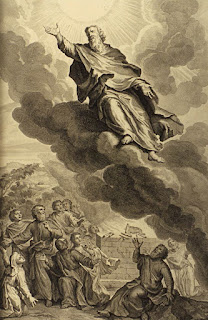A few months ago I wrote a post entitled "A Theology of Drowning." The suggestion I made in that post is that there's a difference between God's love for us and salvation. I then followed that post with a second, pointing out how in the New Testament salvation is consistently referred to as a future event. My point in those two posts was that God loves us, yes, but salvation is something different.
For many readers, this was a confusing distinction. Among progressive Christians especially, God's love for us just is salvation. So to suggest that salvation was something more or different from God's love sent some heads spinning. Which is good. I write to both edify and confound. You're welcome.
In this series we're going to explore another unsettling contrast, that between justification and judgment.
Before we begin, however, fair warning: you are going to hate this series. If you're theologically fragile and easily triggered, a wounded ex-evangelical or dogmatic progressive, you might want to sit this one out.
For myself, I'm a sucker for novel and unique takes on how to read the Bible. I like bold and unusual ideas, if only for the purpose of mapping possible hermeneutical moves and exposing my own hermeneutical biases. For example, you've read a biblical text a million times before and feel 100% confident you know exactly what it means. But then you hear a different take on that passage. And suddenly, "Wow, that text might might not mean what I think it means." One of your blindspots and settled opinions gets checked and unsettled.
This series is going to be a whole lot of that.
Again, you're not going to like it.
I came across this new reading of Paul by reading Gabriele Boccaccini's book Paul's Three Paths to Salvation. I followed that up by reading Judgment and Justification in Early Judaism and the Apostle Paul by Chris VanLandingham. Both books caught my attention by offering a reading of Paul I'd never heard before. And I've heard a lot of readings of Paul. So being surprised was fun. Plus, the reading is plausible and reminded me of things I suggested in my two "Theology of Drowning" posts.
Let's begin.
As described in my recent series on 1 Enoch, Second Temple Judaism lived in expectation of a coming Judgment Day where everyone would be judged according to their works on earth. As I described in the 1 Enoch series, the early Christians inherited that vision of Judgment Day.
And yet, Christians modified things a bit, creating a unique stream within Second Temple Judaism. Two of the most critical innovations occurred with Paul, his teachings about "justification by faith" and his inclusion of the Gentiles. In this view, the offer of grace, to be accepted by faith, was available now to all, both Jew and Gentile, in anticipation of an imminent Judgment. You can see this proclamation neatly summarized in 1 Thessalonians, the earliest New Testament writing:
The Lord’s message rang out from you not only in Macedonia and Achaia—your faith in God has become known everywhere. Therefore we do not need to say anything about it, for they themselves report what kind of reception you gave us. They tell how you turned to God from idols to serve the living and true God, and to wait for his Son from heaven, whom he raised from the dead—Jesus, who rescues us from the coming wrath. (1 Thess 1.8-10)
This was Paul's message in a nutshell: Accept the Lord's message by faith, turn from idols to the Living God, and Jesus will rescue you from the coming wrath. In short, justification by faith saves you at Judgment Day.
Or does it?
As you know, much to the chagrin of Calvinists, throughout the New Testament salvation doesn't seem like a done deal. Justification doesn't provide bulletproof protection on Judgment Day. Those once justified can fail to follow through, can fall from grace, can walk away. True, this is conceived as an unlikely occurrence by the New Testament writers, but it is a real, if rare, possibility. Warnings are offered about falling away, calling for endurance and steadfastness. The justified have to hold fast to stand vindicated on Judgment Day.
All of this raises the classic debate about if we are "saved by faith or works." For example, beliefs about the "perseverance of the saints" is an attempt to bolt justification onto judgment. If justified, then saved. You cannot fall away from grace. We see the appeal of this doctrine--trying to superglue justification onto judgment--because if we have to work to retain or hold onto our status as justified then these post-justification "works" appear to annul the gift of grace. Plus, as many Arminians know, it makes the Christian life anxious if we have to worry about falling from grace when we sin. I recall growing up in the Churches of Christ, an Arminian tradition, constantly worrying about dying right after an egregious sin. Would death have caught me out of a state of grace if I hadn't time to repent? Depending upon the day, I felt I was constantly moving in and out of grace as my moral performance toggled back and forth from sin to repentance. It was both anxiety-inducing and exhausting. It also produces the moral OCD of scrupulosity.
So we can see why we'd want to identify justification with judgment. On the one hand, we don't want to make salvation the product of human effort or works. That seems to annul grace. And on the other hand, we want to avoid the anxiety produced by wondering if our moral performance is sufficient to prevent a fall from grace.
And yet, let's confess, these are our problems. Our concerns. Very Lutheran concerns that we've inherited from the great reformer as he struggled with and rejected the Catholic doctrine of merit. But we have to ask, where these Paul's concerns?
Recall, Paul thought judgment was immanent. So this time of "holding fast" wasn't going to be very long. It was a doable proposition. Hang in there, be faithful, the time is short. But as generations have passed, the lag time between justification and judgment has grown. Most of us are "justified by faith" early in life, and we expect to die before the Second Coming. That's a very long time to "hold fast." Our moral witness ebbs and flows across the lifespan. And as it does, it brings to our attention those New Testament warnings about falling away. It also raises questions about how effortful this moral journey is. You have to work very hard at it, day in and day out, decade after decade. Which raises the question: Isn't all this work morphing into a works-based righteousness? Especially when we compare ourselves to believers who are putting in precisely zero work and effort? How, exactly, is justification and sanctification supposed to work? Can those "justified by faith" behave any way they please, for their entire lives, with no consequences? If so, what's the point of putting in any work at all in following Jesus if none of it matters? Is not faith dead without works? And yet, if we do work hard, and think that work matters before God and will be rewarded by God, are we are not expecting to be judged by our acts of righteousness instead of grace?
We enter here the tempest of questions that have swirled around these issues since Martin Luther. But again, these are our issues, not Paul's. Paul never had to deal with the theological, moral, and pastoral implications of a delayed parousia.
Which brings us back to the exploration of this series. How, exactly, did Paul view the relationship between justification and judgment?
Stated succinctly, Boccaccini and VanLandingham argue that, for Paul, justification refers to the past and that judgment points to the future. Justification, for both Jew and Gentile, means being rescued from the power of sin and transferred into the kingdom of God. And that is more of an event than a status. You've been pulled out of the quicksand and now stand, by the grace of God, on solid ground. Rescued, but not saved yet, not fully or finally, emancipated from our powerlessness and impotence to now serve the Living God. We "have been justified" as we point back to accepting Jesus "by faith." But from that moment on, having been justified and ransomed by the blood of Jesus, empowered and emancipated the the power of the Holy Spirit, future judgment will be according to your deeds and works. In this view, justification is a "fresh start" for sinners, wiping our slate clean. Justification is also, via the Spirit, the empowerment to obey God. Justification, in this sense, through forgiveness (the blood of Jesus) and empowerment (the indwelling Holy Spirit), creates a capacity for righteousness. And having been gifted this capacity, Judgment Day will evaluate how we've put this capacity to use. You will be judged by your deeds, how, in the words of Paul, faith works itself out through love. Which is why, for the justified, love is more important than faith. Prooftext: See 1 Corinthians 13.
Before grace, you were crippled. Faith heals you, and signs you up for the marathon. Love is running the race, and love is what gets you across the finish line. And there a prize awaits you as the Lord rewards each according to their works. So run, and don't give up. But here's the thing: You have to run. Justifying faith has to produce the fruits of love. For everyone will be judged by those fruits. Believing in Jesus is not enough. Even the demons believe.
In summary, justification by faith and judgment by works.
Rephrased to make this a little more palatable: justification by belief and judgment by love.
If this strikes you as a contrast you've never considered before, that was my reaction as well. In the posts to follow we'll walk through the Biblical evidence for this position and you can decide what you think.
And for what it's worth, the Lord judging humanity by the criteria of love isn't the worst idea I've ever heard. So count me intrigued...




















